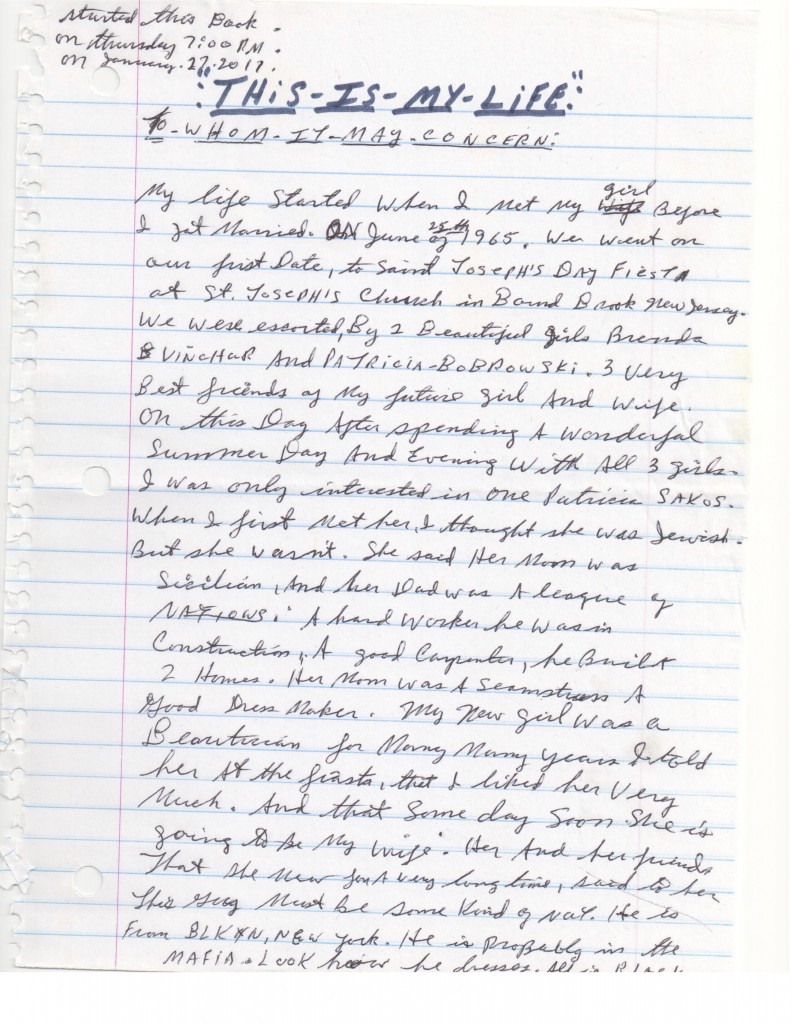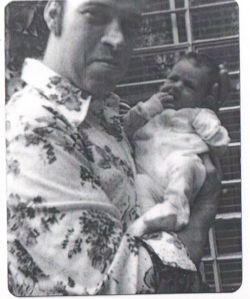We’ve chosen Jeneen Interlandi’s recent New York Times magazine cover story about her father’s mental illness as our latest Notable Narrative. “When My Crazy Father Actually Lost His Mind” follows a sobering episode in the bipolar history of Joseph Interlandi, revealing flaws in the nation’s mental health and criminal justice system. We caught up with Interlandi by email as she was preparing to transition from her native New Jersey to Cambridge, to begin her fellowship year at our mother ship, the Nieman Foundation for Journalism at Harvard.
How did you decide to write this story?
Very impulsively! When the Arizona shooting happened, and the news broke that people who knew the gunman Jared Loughner had suspected he was seriously mentally ill, my family was in the middle of navigating our own situation. I remember being so frustrated by all the conversations taking place about how somebody should have taken the initiative and gotten (Loughner) committed to a psychiatric hospital, etc. One day, as both these stories were unfolding, I sent my editor a pitch memo, out of sheer indignation. Then when it came time to actually do the story, I panicked – like “Oh no, what have I gotten myself into?”
How did you report it? You used at least one court transcript from one of your father’s court hearings, and what else?
I tried to be as methodical as possible. I’d never written a first-person piece before and was very concerned about relying too much on my own memories, or letting my emotions overwhelm the larger points that I wanted to make.
So I started with the documents: several court transcripts – from the commitment hearing, the restraining order hearing, and the sentencing hearing; a dozen or so police reports, from all the various incidents; hundreds of pages of medical records; my own email exchanges with various social workers, etc.; and last but not least, both of my parents’ journals. From all of those I constructed a detailed timeline of what happened when, and what the doctors, police officers, psychiatrists, etc. were saying at each point along the way. Then I tracked down the other families. I talked to about 30 families in all. Some I found through this one nonprofit that advocates for stronger involuntary commitment statutes across the country. Others I found from newspaper archives and from congressional hearings where families like mine had testified in support of, or opposition to, various involuntary commitment laws that were being proposed in one state or another.

One of Joe’s sketches. (courtesy Jeneen Interlandi)
After I had all of that, I looked into the research on involuntary commitment: talked to the academics and public health folks who were focused on the issues surrounding community mental health, mental illness and violence, etc. I saved the folks who worked directly with my father – the representatives of the specific agencies that we came into contact with – for last. I wanted to make sure I had all my ducks in a row before confronting them with anything. I also didn’t want the story to be overly focused on my parents’ hometown. I wanted it to be clear that these problems are national in scope. Also, I interviewed my parents, several times, throughout the reporting. And checked in with my siblings and with one childhood friend, to verify certain details against my own memory.
Hold on. How did you get your parents to let you read their journals?
I asked them, or rather told them, when they first agreed to do the story: “Hey, I will need all of your journals, both of you. Also, pop has to sign all these forms granting me access to all of his medical records.” (Also, “You won’t get to see what I write about you until the story is out in print. So you’ll just have to trust me until then.”) They didn’t even flinch. Of course, it helped that I am their daughter. It also helped that I had done this story on minimal consciousness a few months earlier that they both read. That piece had also come out of a personal experience with someone very close to me, and to my parents (not the person I focused on in the story). My parents knew from that piece what kind of story I was looking to write, and understood how it could maybe help other people to know about what we went through. So they were pretty fearless.
How did you choose not to include material from the journals, particularly your father’s?
 I thought at first that I would. There is this big huge stack of them and even just looking at the writing, without reading the words, you can tell that it’s manic. But as I read through them, I found that they didn’t add any essential details. I wanted the reader to understand that my father was very sick at the time that the story takes place. But I didn’t want to, like, beat them over the head with it, or add a ton of gratuitous details just because I had access to them. Because ultimately this story is about the mental health system more than it’s about any one person’s particular psychosis. (I also admit to being protective of my father here. I think it’s enough to say that he was paranoid and delusional—that he hit my mother, and tried to jump out of a moving car, and threatened to kill himself. To include more than that felt exploitative).
I thought at first that I would. There is this big huge stack of them and even just looking at the writing, without reading the words, you can tell that it’s manic. But as I read through them, I found that they didn’t add any essential details. I wanted the reader to understand that my father was very sick at the time that the story takes place. But I didn’t want to, like, beat them over the head with it, or add a ton of gratuitous details just because I had access to them. Because ultimately this story is about the mental health system more than it’s about any one person’s particular psychosis. (I also admit to being protective of my father here. I think it’s enough to say that he was paranoid and delusional—that he hit my mother, and tried to jump out of a moving car, and threatened to kill himself. To include more than that felt exploitative).
They were incredibly supportive. My mother especially, felt very strongly that other people should know what families like ours are going through. She said over and over that the story would help other families feel less alone, and that maybe it would trigger some changes in the way things are done (she’s an optimist!). My father and siblings just trusted me implicitly to do right by them. I think I asked my parents every week, for like six months straight, “Are you sure you’re okay with this?” and every time they said, “Yes. We’re sure. Stop asking.” I didn’t show it to any of them before it closed, so I was super nervous when it finally went live. But they all had the same reaction: They laughed, they cried, they were proud. My father said, “You hit the nail on the nail!” Which is about as good as it gets.
What didn’t make it into the story?
The journals, for the reasons I just mentioned; and all but a small handful of the many families I spoke with whose experiences were so eerily similar to mine and to one another’s; and a whole article’s worth of anecdotes and descriptive details about my parents as characters (which I will resist the urge to include here).
Maybe just one?
What was the writing process like? How do you organize? How do you work?
The overall workflow was the same as it usually is for me. I organize all my interviews and notes in an order that vaguely reflects the structure I’ve envisioned, then have them bound into a spiral book at the print shop (this one was something like 75 pages, which is about average). Then I read through it like a book and highlight what I am going to transfer into the outline (that will eventually become the first draft). By the time I’m done with that, I usually know how I want the story to start, and what the key contextual sections need to consist of. I did have many more throat-clearing drafts for this piece than I’ve had with any previous pieces. By that I mean, I wrote pages and pages – that my editor never even saw – describing my parents as parents, and going through all the anecdotes and incidents that have loomed so large in my mind for so many years. Then I walked away from it for like a week. And then came back and forced myself to whittle that section down from 2,000 words to like 500. I was very worried about being gratuitous in my descriptions; obviously I know these people so well that I could really weigh the piece down with all the details in my head. I was also worried about being too defensive, i.e., I tell you some unpleasant things about my dad, and to compensate, I want to tell you like 10 times as many good things. It took some time to get over that.
I admired the sectional cliffhangers, like this one:
We considered our options. We could lift the restraining order and bring him home. But if he spun out of control, we would have no way to protect our mother. Friends and relatives suggested that we offer no assistance and let him “hit rock bottom.” But it was now early January, and we could not bring ourselves to leave him with nothing in the biting cold. So we fashioned something of a compromise. We kept the restraining order but dropped off some money and a suitcase full of clean clothes at the front desk of the short-term facility. We crossed our fingers and waited.
How did you arrive at the story’s structure?
I think this is the only piece I’ve done so far where the structure wasn’t a huge challenge and didn’t change much from first draft to last. It really came straight out of the timeline that I constructed from the documents. On one hand, there was all this monotony of, “He went to the hospital. Then he went to jail. Then he went to the hospital again,” and on and on. But on the other hand, there were a couple of really dramatic moments, like the commitment hearing, and when he called my mother threatening to kill himself. It was clear just from the timeline that those elements needed to balance each other out. And that if you wrote it any other way than chronologically, it would be unnecessarily confusing, because there was just so much to-ing and fro-ing.
How did you choose this particular episode to write about?
This particular episode happened to coincide with this horrible incident – the shooting in Arizona by Jared Loughner, who was later diagnosed with paranoid schizophrenia – that had sparked a wave of national interest in the issues surrounding involuntary commitment. It also happened when I was in the process of leaving my staff writer job at Newsweek to freelance and to pursue longer-form narratives. More importantly, though, it was the first episode that I really saw up close (that we recognized as an episode, anyway). When my father was first diagnosed as bipolar, back in 2005, he went through a very similar cycle of repeated hospitalizations. But I was in the Arctic Circle, on Alaska’s North Slope, at the time, and so didn’t really grasp the forces that were shaping those events. I remember thinking that if only I had been there and had been proactive – made phone calls, sent out emails, confronted doctors and judges – things would have gone more smoothly. As it turns out, I was totally wrong.
What’s the most surprising thing you discovered about the mental health system?
That my family’s experience was not even remotely exceptional. Before I started digging around, I really thought that we were somehow missing something (by) not contacting the right agencies, or not providing the right information to the right people. But after not very much time, it became clear that this was the norm, not just in New Jersey where my parents live but all across the country.

I found the ending to be exactly right for the subject matter, and full of tension. Did others agree? Did you or your editor worry that it was too open-ended?
That ending took a bit of work. Originally it was much more discreet. I just said, basically, “My dad is all better, we played cards, we forgave each other and that’s the end of it.” But fortunately, my editor, Vera Titunik, pushed me to rethink it. She kept saying, “You’re missing something here.” And she was right. Because bipolar disorder is obviously a lifelong condition, I think we actually wanted it to be more ope- ended. That’s the reality of it: You don’t know when or where another episode might occur, and beyond medication and therapy there is nothing to do with that uncertainty but live with it. For my parents, that means putting their characteristic spin on things: “Here is one more wacky misadventure for our personal archives. Now let’s eat some lasagna.”
How’s your dad?
He is great! Really back to himself right now, which means that my parents are back to themselves – growing old together and enjoying their grandkids and counting their blessings.
Jeneen Interlandi is a New Jersey-based health and science journalist who writes about biomedical research, public health and environmental science. She has written for the New York Times magazine and Scientific American, and spent four years as a staff writer at Newsweek. In 2009, she received a Kaiser Foundation Fellowship for global health reporting and traveled to Europe and Asia to cover outbreaks of drug-resistant tuberculosis. She has worked as a research assistant at Harvard Medical School and studied climate change in Alaska. She holds master’s degrees in environmental science and journalism, both from Columbia University, and is an incoming Nieman Fellow at Harvard.



